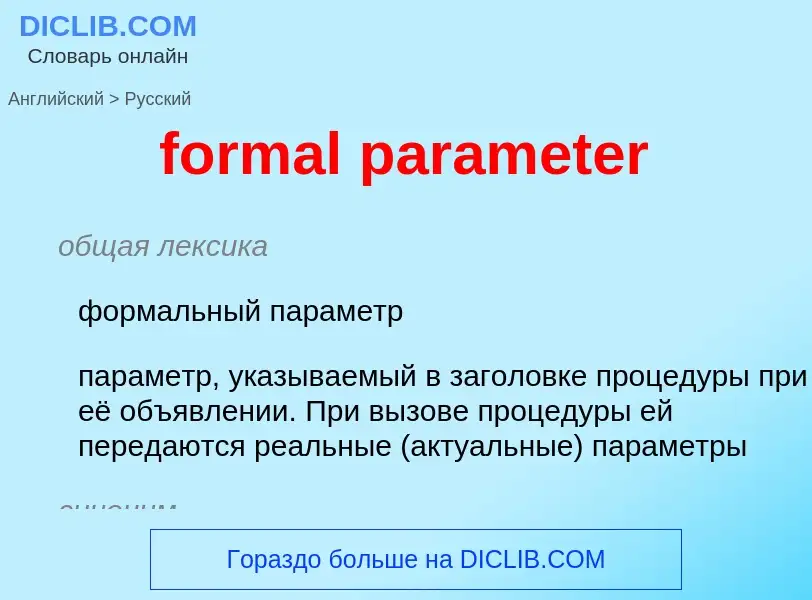Перевод и анализ слов искусственным интеллектом
На этой странице Вы можете получить подробный анализ слова или словосочетания, произведенный с помощью лучшей на сегодняшний день технологии искусственного интеллекта:
- как употребляется слово
- частота употребления
- используется оно чаще в устной или письменной речи
- варианты перевода слова
- примеры употребления (несколько фраз с переводом)
- этимология
formal parameter - перевод на Английский
общая лексика
формальный параметр
параметр, указываемый в заголовке процедуры при её объявлении. При вызове процедуры ей передаются реальные (актуальные) параметры
синоним
Определение
Википедия
In computer programming, a parameter or a formal argument is a special kind of variable used in a subroutine to refer to one of the pieces of data provided as input to the subroutine. These pieces of data are the values of the arguments (often called actual arguments or actual parameters) with which the subroutine is going to be called/invoked. An ordered list of parameters is usually included in the definition of a subroutine, so that, each time the subroutine is called, its arguments for that call are evaluated, and the resulting values can be assigned to the corresponding parameters.
Unlike argument in usual mathematical usage, the argument in computer science is the actual input expression passed/supplied to a function, procedure, or routine in the invocation/call statement, whereas the parameter is the variable inside the implementation of the subroutine. For example, if one defines the add subroutine as def add(x, y): return x + y, then x, y are parameters, while if this is called as add(2, 3), then 2, 3 are the arguments. Note that variables (and expressions thereof) from the calling context can be arguments: if the subroutine is called as a = 2; b = 3; add(a, b) then the variables a, b are the arguments, not the values 2, 3. See the Parameters and arguments section for more information.
The semantics for how parameters can be declared and how the (value of) arguments are passed to the parameters of subroutines are defined by the evaluation strategy of the language, and the details of how this is represented in any particular computer system depend on the calling convention of that system. In the most common case, call by value, a parameter acts within the subroutine as a new local variable initialized to the value of the argument (a local (isolated) copy of the argument if the argument is a variable), but in other cases, e.g. call by reference, the argument variable supplied by the caller can be affected by actions within the called subroutine.

